Thursday, December 8, 2011
1977-78 St. Louis Blues Red Berenson Jersey
Red Berenson, born on this date in 1939, began by playing with the Regina Pats in Canadian junior hockey, which included two Memorial Cup appearances in the three years he played for the Pats, highlighted by his 1957-58 season during which he scored 46 goals and 95 points in 51 games.
He then joined the Belleville McFarlands, who represented Canada at the 1959 World Championships, where they captured the gold medal thanks in part to Berenson's 9 goals in 8 games. Upon his return from Europe, he joined the Flin Flon Bombers for playoffs to conclude his busy season.
Berenson then made the unusual and somewhat controversial choice of joining the University of Michigan Wolverines of the Western Collegiate Hockey Association for the 1959-60 season, as his NHL rights holders, the Montreal Canadians, advised him against the move. As a freshman, he scored 19 points, a total that jumped to 49 as a sophomore before peaking at 70 as a junior in 1962. Following the conclusion of the NCAA playoffs, Berenson joined the Canadiens for four regular season games (including scoring his first NHL goal) and five playoff games, becoming the first Canadian to ever make the jump from American college hockey to the NHL.
He split the next season between the Canadiens and the their Hull-Ottawa minor league club. He cracked the Montreal lineup for the entire 1963-64 (16 points in 69 games) but faced the issue of the incredible depth Montreal possessed at center, with the likes of Jean Beliveau, Henri Richard and Ralph Backstrom. As a result, Berenson played with the American Hockey League's Quebec Aces for essentially all of the 1964-65 season and split his time between Quebec and Montreal in 1965-66. Despite playing just 3 regular season games for Montreal in 1964-65, he was called up for the playoffs and appeared in 9 games as Montreal won the Stanley Cup, the only one of Berenson's career.
With the lineup in Montreal deeper than the ocean, Berenson was dealt to the New York Rangers in the 1966 off-season, but over the course of 49 games divided over two seasons, he only managed to score 8 total points. Rather than finding himself on his way back to the minors though, this was the season of the great NHL expansion, where six new clubs joined the league, creating over 120 new jobs for players, one of which was waiting for Berenson in St. Louis with the Blues following a trade.
Berenson was immediately energized by his new situation and reeled off 22 goals and 51 points in 55 games, eclipsing the 45 total points he had scored in his career up to that point. His 55 points also made him the leading scorer for the Blues despite spotting everyone a 20 game head start! St. Louis then, benefitting from being in the West Division, made up of the six new expansion clubs, made it all the way to the Stanley Cup Finals.
Now firmly established as a team leader, Berenson again led the Blues with 35 goals and 82 points in 1968-69, 34 points more than Gary Sabourin's second-most 48, which tied Beliveau for 8th place in league scoring.
Also during that season, he became the first player since 1944 to score 6 goals in a game, which he did against the Flyers in Philadelphia, making him the first ever to accomplish the feat on the road. Of his 6 goals, four came in a span of 9 minutes and none of the 6 were scored on the power play or off deflections.
During the postseason, St. Louis again made it to the Stanley Cup finals as Berenson contributed 10 points in 12 games.
Berenson was named team captain for 1970-71, but his third season in St. Louis lasted only 45 games, as, with 42 points to his credit, he was traded to the Detroit Red Wings in February of 1971 just as the Red Wings entered the worst doldrums in franchise history. In Berenson's five seasons in Detroit, the Red Wings would not qualify for the playoffs even once. Still, he continued to play his strong brand of two-way hockey and managed to score 69 points in 1971-72 and 66 in 1973-74. He also served as the Red Wings captain in 1973.
Also during his time in Detroit, Berenson was named a member of Team Canada for the 1072 Summit Series against the Soviet Union, appearing in a pair of games.
Berenson then returned to the Blues for the second half of 1974-75, only this time in a checking role, as his point production would not reach 50 points during the final four seasons of his career, although he still was a contributor on offense, recording two more 20 goal seasons in 1975-76 and 1976-77 to give him eight for his 17 year NHL career, during which he played in 987 games, scoring 261 goals and 658 points and appeared in six NHL All-Star Games. His leadership was also welcomed back in St. Louis, as he served two stints as captain for the Blues in 1976 and 1977-78.
After his retirement as a player, Berenson became the Blues head coach midway through the 1979-80 season and later won the Jack Adams Award as the league's Coach of the Year. By 1984, Berenson became the head coach at the University of Michigan, a position he has held to this day, a span of over 25 years, which has included two national championships in 1996 and 1998.
Today's featured jersey is a 1977-78 St. Louis Blues Red Berenson jersey. The original Blues white sweaters had a single wide, yellow stripe outlined in blue on the arms and waist, which changed to the pattern of blue trimmed in yellow and outlined in blue for their second season of 1968-69. This jersey remained virtually unchanged all the way through the 1983-84 season, with the main change being the addition of names on the back in 1974. With this jersey being from the 1977-78 season, it's clear that the nameplate has been removed at some point.
While Berenson originally wore #7 in his first stint with the Blues, Gary Unger was wearing it when he returned and Berenson went with #9.
Today's video segment begins with Berenson discussing his time in St. Louis and the impressive history of Blues players who have worn #7.
Next is the ceremony honoring the four Blues notables to have worn #7, Berenson, Unger, Joe Mullen and Keith Tkachuk.
Labels:
Berenson Red,
St. Louis Blues
Subscribe to:
Post Comments (Atom)

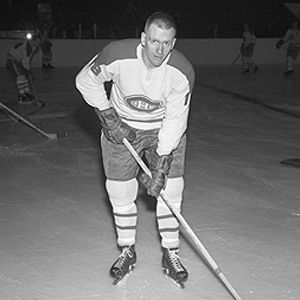
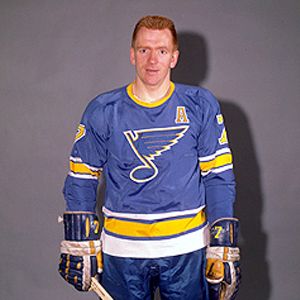
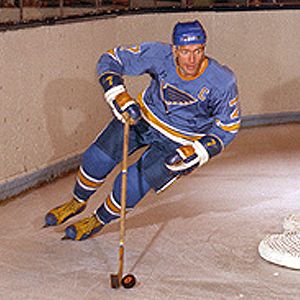
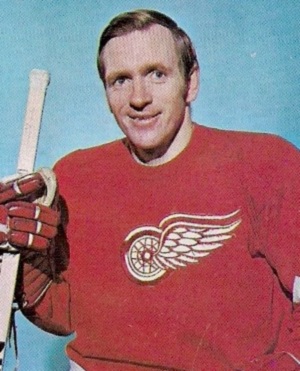
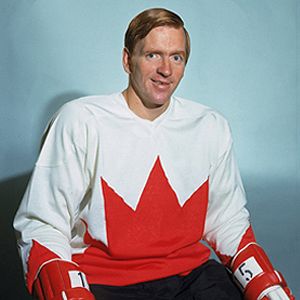
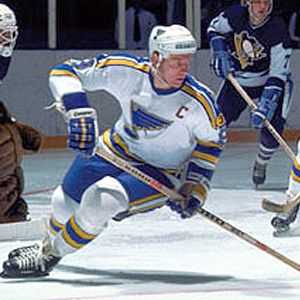
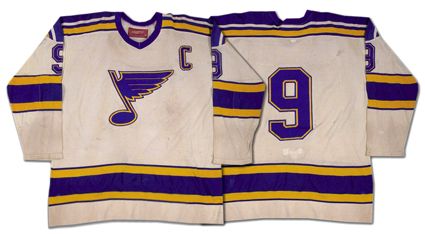










No comments:
Post a Comment
We welcome and encourage genuine comments and corrections from our readers. Please no spam. It will not be approved and never seen.